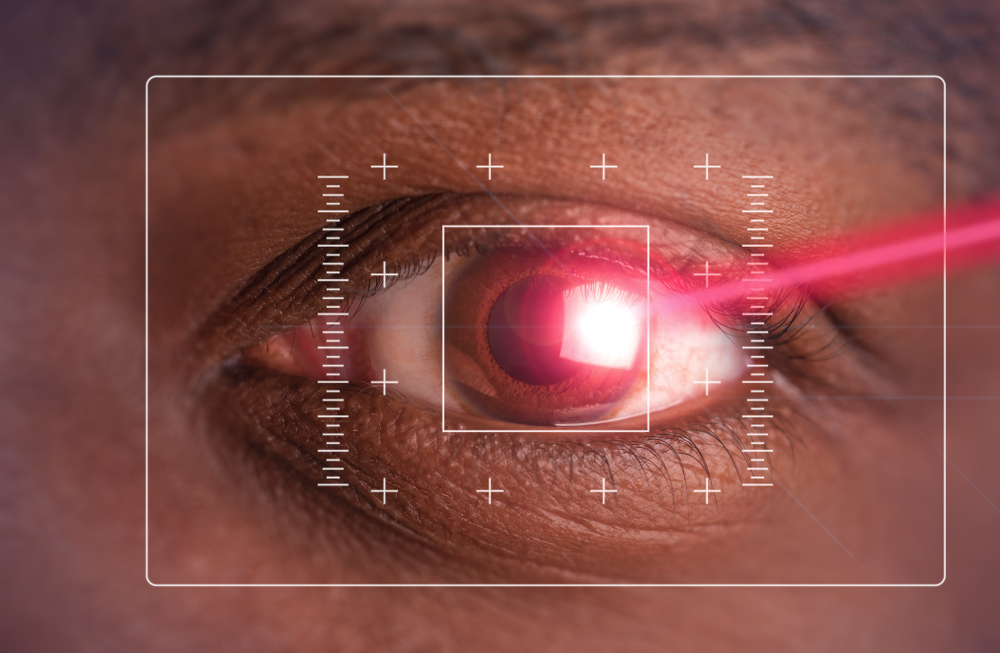
LASIK surgery can change the way that you see the world around you. With its typically quick recovery and mostly painless procedure, it’s easy to see why LASIK is one of the most popular eye surgeries in the US. If you’re considering it, too, it’s important to know what exactly to expect if you undergo the surgery.
We’ll discuss pre-procedure preparation, what will happen during the surgery, and what you can expect after in terms of recovery.
Table of Contents
How To Prepare For LASIK Surgery
What To Expect
The first step on your journey to LASIK is to set up a consultation. At this point, your doctor will walk you through the process, explain the benefits, and warn you about the risks.
The benefits of LASIK include:
- LASIK can give you improved vision that reduces your reliance on glasses or contacts
- About 99% of people have vision of 20/40 or better after the procedure without glasses
- More than 90% end up with 20/20 vision
There are some risks, though, including:
- Issues with your cornea that require further treatment or surgery
- Corneal ectasia, which is the weakening of your cornea
- Inflammation or infection that will need to be treated with medication
- Vision that’s worse than before you had LASIK, which will require treatment
Some side effects that you may experience are:
- Glare around lights
- Reduced night vision
- Blurred vision
- Tiny red or pink spots on the white of your eye
- Sensitivity to light
- Dry Eyes
Comprehensive Eye Exam
After your consultation, they will perform a comprehensive eye exam to determine your eligibility for the surgery. During your comprehensive eye surgery, they will look at:
- Your general medical history
- Any medications you're currently taking
- The shape and thickness of your cornea
- Your pupil size
- Your refractive errors
- Any pre-existing ocular conditions
Once you’re approved, you can get your surgery scheduled.
Pre-Procedure Instructions
Your preparation for your LASIK surgery will need to start a couple of weeks beforehand.
Be Informed
Make sure that you’ve read any information that’s been given to you about the surgery, and ask any questions that you have. It’s better to go prepared with knowledge of what’s going to happen than to be surprised during the procedure.
Avoid Contacts
If you’re wearing soft contact lenses, most surgeons will ask that you stop using them about two weeks before your surgery.
If you’re wearing rigid contact lenses, then it may be asked that you stop using them about four weeks before your surgery.
Stop Using Make-Up and Lotions
On the day of your procedure, or even a couple of days before, make sure that you are not wearing make-up, perfumes, or facial moisturizers. These products can get into your eyes and increase your risk of infection.
Arrange For Someone To Drive You
After your surgery, you should not drive until your doctor has given you permission to. You will need to ask someone to drive you home after the procedure, as well as for your check-up the next day.

The LASIK Procedure: A Step-by-Step Walkthrough
Arrival and Pre-Procedure Prep
You are asked to arrive promptly at the appointment time for your procedure, especially if there is paperwork that needs to be filled out.
Anesthetic Eye Drops and Lid Speculum
Before the procedure begins, numbing eye drops will be administered to ensure that the surgery is as pain-free as possible.
Next, a small, metal instrument called a lid speculum will be used to hold your eyelids open and in place for the surgery.
Creating The Corneal Flap
Once the lid speculum is in place, a precision flap-making instrument will be meticulously put into position. You’ll be asked to focus on a special fixation light and the surgeon will activate the precision instrument electronically. This will fold away a corneal flap, making the middle layer of the cornea accessible.
Reshaping the Cornea
After, the cornea is reshaped by an excimer laser. This is done differently depending on which ocular condition you are trying to treat.
Myopia
The cornea is flattened to reduce the converging power of the eye. This is done by removing more tissue from the center of the cornea than around.
Hyperopia
The central cornea is steepened to enhance the converging power of the eye. This is done by removing more tissue from the periphery than the center.
Astigmatism
The cornea will be made more spherical by changing the pattern of the beam, which can remove tissue in one direction more than the other.
Repositioning The Corneal Flap
Once the reshaping is finished, the flap will be put back in place and will naturally be held there by the moisture in your eye for fast healing.
Immediate Post-Procedure Steps
Once the surgery is completed, you will be prescribed eye drops to help reduce inflammation and avoid infection while your eyes heal. It may cause slight stinging when you start using them, but this is normal and they should continue to be administered as directed by your doctor.
You may also be prescribed artificial tears to avoid dry eyes after surgery. The artificial tears should keep your eyes full of moisture and comfortable. They may also provide you with a shield to protect your eyes and stop you from touching them.
What to Expect After The LASIK Procedure
LASIK Recovery
In most cases, recovery from LASIK surgery is extremely fast.
Many can return to work within a few days and, with caution, can start driving again. A side effect of LASIK surgery is blurred vision, so be aware of the state of your vision before you get behind the wheel.
Some activities should be limited while your eyes heal. It is situational, but the general guidelines are:
- Wait three days before exercising
- Wait two weeks to use make-up or lotion near your eyes
- Wait at least one month to play contact sports
- Wait one to two months to swim or use hot tubs
Healing Timeline
Most people have 90% of their best vision possible after the procedure. Within a couple of days, you will notice an improvement. But it will take three to six months for your eyes to fully recover and heal.
For the first week after your surgery, you may experience:
- Dry eyes
- Watery eyes
- Sensitivity to light
- Discomfort or mild pain in your eyes
- Puffy eyelids
It’s vital that you do not touch your eyes during this week so that they can heal.
Long-Term Care
For long-term recovery, you will need to attend check-ups with your doctor to monitor your progress. After your post-op check-in, you should be checking in with your doctor about once every one or two years, unless they recommend more frequent visits.
The LASIK Procedure With Specialty Eye Institute
LASIK surgery is a life-changing procedure with the ability to vastly improve your vision and reduce your reliance on glasses or contacts. It’s a huge decision that can cause monumental change, and you should only let the most experienced, skilled doctors help you make it.
The trusted team at Specialty Eye Institute is here to help you every step of the way, from deciding to undergo LASIK surgery, to efficiently and safely performing the procedure, to ensuring that your recovery goes smoothly.
If you’re interested in discussing LASIK surgery with us, call us at 866-435-8935 or request an appointment on our website. You can also take our LASIK self-test online for free.
See our list of FAQs about LASIK surgery for more information.
 877-852-8463
877-852-8463 Careers
Careers Locations
Locations Patient Portal
Patient Portal Request Appointment
Request Appointment








 877-852-8463
877-852-8463
